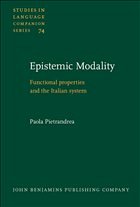Nicht lieferbar

Epistemic Modality
Functional properties and the Italian system
Versandkostenfrei!
Nicht lieferbar
Main description:This volume offers an original theoretical and methodological approach to the hotly debated issue of epistemic modality. The analysis is conducted in a rigorous typological frame developed after a careful consideration of a wealth of cross-linguistic data, and focuses on Italian, a language often disregarded in comparative analyses. The complexity of the Italian epistemic system provides relevant information that will undoubtedly foster a better understanding of the topic. A new definition of epistemic modality is proposed on a functional basis and the structure of the Italian...
Main description:
This volume offers an original theoretical and methodological approach to the hotly debated issue of epistemic modality. The analysis is conducted in a rigorous typological frame developed after a careful consideration of a wealth of cross-linguistic data, and focuses on Italian, a language often disregarded in comparative analyses. The complexity of the Italian epistemic system provides relevant information that will undoubtedly foster a better understanding of the topic. A new definition of epistemic modality is proposed on a functional basis and the structure of the Italian epistemic system is closely described. The morpho-syntactic characteristics of Italian epistemic forms are regarded as the result of the dialectic between universal functional pressures and peculiar system resistances. Shaped by the system, epistemic modality emerges as an intrinsically linguistic category, which cannot be downsized to a mere conceptual notion, as other approaches would propose.
Table of contents:
- Abbreviations
- Introduction
- The notional category of epistemic modality
- A typological classification of epistemic systems
- Epistemic modality in Italian
- Semantic oppositions
- A typological characterization of italian epistemic modality
- Inflectional and distributional constraints.
- Aspectual constraints on the propositional content
- The incompleteness of the propositional content and the meta-propositionality of epistemic modality
- A diachronic hypothesis
- Conclusions
- Notes
- Bibliography
- Subject Index
This volume offers an original theoretical and methodological approach to the hotly debated issue of epistemic modality. The analysis is conducted in a rigorous typological frame developed after a careful consideration of a wealth of cross-linguistic data, and focuses on Italian, a language often disregarded in comparative analyses. The complexity of the Italian epistemic system provides relevant information that will undoubtedly foster a better understanding of the topic. A new definition of epistemic modality is proposed on a functional basis and the structure of the Italian epistemic system is closely described. The morpho-syntactic characteristics of Italian epistemic forms are regarded as the result of the dialectic between universal functional pressures and peculiar system resistances. Shaped by the system, epistemic modality emerges as an intrinsically linguistic category, which cannot be downsized to a mere conceptual notion, as other approaches would propose.
Table of contents:
- Abbreviations
- Introduction
- The notional category of epistemic modality
- A typological classification of epistemic systems
- Epistemic modality in Italian
- Semantic oppositions
- A typological characterization of italian epistemic modality
- Inflectional and distributional constraints.
- Aspectual constraints on the propositional content
- The incompleteness of the propositional content and the meta-propositionality of epistemic modality
- A diachronic hypothesis
- Conclusions
- Notes
- Bibliography
- Subject Index




